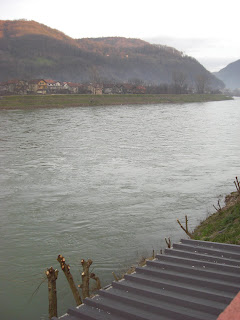
Laid in one night, six pm with the sun long gone from the mountain side, the sound of cats and dogs pinned in to tightly together serenades me over head. My landlords, a kindly elderly couple, have an impressive collection of ugly mutts and stray cats. The rain is near frozen outside tonight, but the air smells comforting, a combination of water, cold, stove fires, and collective cooking. The neighborhood, where I live, is a labyrinth of homes cut into smaller homes, courtyards built off courtyards. From the streets one sees double doors (some elaborately carved, some of fine straight wood, and some corrugated metal), high walls, and balconies with laundry, but behind the doors are twists and turns from homes extended and apartments carved out, new homes inside old ones and vice versa. The cats live in the gaps between, with the roses and the spiders. On misty nights the smell of garlic, peppers, and hot bread mingles with the mist, the call to prayer and the church bells. When I was a kid I remember night bringing the sounds of yelling, sirens, car alarms, and passing bass. No one yells here, or at least rarely.
Once you pass through my courtyard’s metal doors, Killer (the name I have given the long haired raggedy dog who guards our homes) greets you with either a friendly wag of his tail and his head to pat, or a half interested glance from inside his dog house. His food bowl is generally full, with old bread, cut up hot dogs, and butter cookies. Poor Killer. You then step down, ducking your head beneath overhanging vines, into the cement yard, which is always dotted with pools of shallow water, the landlords cloths line is generally holding up one sweater and a kitchen towel (a different set every day or two). This fall, before the snow arrived on 12 October, my landlord was pressing barrels of small apples, cooking them with “mountain plants” and preparing something to be consumed to cure fevers. Today the yard holds my stove.
A man from work told me I live in the “shadow”. In old Sarajevo, or before Sarajevo existed, there were two towns on opposite sides of the river. Mine was known as the shadow because this mountain gets less sun then the other mountain. “Men in your community are smaller, weaker, because they didn’t play in the sun as boys”.
After another full day of snow, rain, and sleet storms spent in the library discussing the ideal construction of a book of oral histories from rural Bosnia with a colleague at work, I found that my stove had migrated from the courtyard to in front of my door.
“How goes it?” asked my landlord.
“Fine, how are you?”
“Good, I was looking for you” she said. “We have the stove for you and a television... do you watch television?”
“Well, I don’t really need the television, but thanks a lot for the stove.”
“Yeah my sons will come by later to bring it in.”
“Great.”
And then the wait began. What exactly “later” means in Bosnia is yet unclear to me. Later can mean hours, days, weeks, or seemingly even months. I had assumed, incorrectly, that since the stove was already by my door, it was raining out, and the sons live in the apartment above mine that later would mean a few hours. Five hours later, long after dark and civilized visiting hours, the sons had yet to materialize. I sat there in my one room apartment growing increasingly annoyed. Annoyed that my stove was sitting out in the rain, annoyed that was not drinking mint tea to warm my hands, annoyed that I was annoyed and that I was spending so much time thinking about the stove sitting just outside my doorway. And then I remembered something. I am my mother’s daughter. So simple a thing, but Kennedy women carry their own luggage, chop down trees, build houses, and birth 11 lb babies (note to reader I was not 11 lbs)... Kennedy women can certainly move a stove... well two stoves, the old one had to go outside so the new one could come in. So, in the strength of this recently remembered, and hopefully true, genetic legacy I got off the couch, pulled on my boots and swung open my front door to be hit fully in the face by a wall of icy wind and driving rain. Much to, I assume, the amusement of my neighbors across the courtyard I spent the next twenty minutes pushing, pulling, adjusting and readjusting. But in the end I, and the female Kennedy legacy, triumphed. Perhaps my sense of accomplishment is overblown, and slightly pathetic, but as I not so slowly approach 30 I seem to still need reminding that I am invincible... oh wait no that wasn’t the lesson. I seem to be continuously reminded that I am strong and fully capable. This does not mean that I never need help, or that I would not like help if it were available, but much like my much beloved Paper Bag Princesses, I cannot and will not eternally sit around waiting for someone’s son to help me.
Especially as, having been raised in the Shadow, I am most likely stronger than them anyway.







